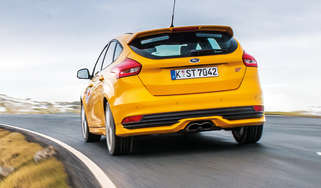Used Porsche 911 GT3 (992.1, 2021-2024): review, history, specs and buying guide
So bereft of current rivals is the new 911 GT3 that you’re best to look to the used market and its predecessor, the 992.1 911 GT3
The whispers and rumours start long before the arrival of each new generation of Porsche 911 GT3. The most asked question; how on earth can Porsche make the most distilled, sharpened, finely honed incarnation of the world’s favourite sports car better than the last one? It’s a question that even Porsche Motorsport itself, in the face of increasingly prohibitive legislation and exacting customer demands, has found more and more difficult to answer.
The latest 992.2 GT3, by all accounts, has been an exercise in preserving what was spectacular about the outgoing car, refining and improving the existing formula, rather than overhauling it. Which of course begs the question; exactly how appealing is the idea of waiting for a 2025 911 GT3 to go from ordered to delivered, versus taking your pick of the litter of used 992.1 GT3s that are already out there?
No matter how many times you’ve sat in a GT3 there’s something about it that raises expectations when you sink into its seat, flex your fingers around the steering wheel and glimpse the GT3 script in the analogue tacho for the first time. As a series production car that makes you feel hardwired to the hardware, few match a GT3, whichever generation you find yourself behind the wheel of.
Porsche 992.1 GT3 history
The 992.1 GT3 went on sale in February 2021 with a £123,100 price tag and the first deliveries took in May that year. The wingless, but mechanically identical, Touring joined the line up in June 2021. The GT3 It was based on the 992 911 but in typical Porsche style its evolution was carefully managed, sharing its basic underlying chassis and naturally aspirated powertrains with the previous 991. Yet while the 992’s subtle on-paper changes might not appear to be significant, its big improvement (over 17 seconds) against the stopwatch around a certain German track reveals the detail changes that made the 992.1 GT3 more capable than ever before.
More reviews
Group tests
Long term tests
Reviews
- Porsche 911 Carrera S 2025 review – a 473bhp BMW M4 CS fighter
- Porsche 911 GT3 (992.2) 2025 review – the best GT3 yet?
- Used Porsche 911 GT3 (991, 2013 - 2019) review, specs and buying guide
- Porsche 911 Targa 4 GTS 2025 review – the 911 that shouldn’t make sense
- Porsche 911 Carrera GTS 2025 review – the best 992 Carrera yet
The 992.1 GT3 also gave its lucky buyers more choice than ever, with both six-speed manual and seven-speed PDK transmission options, as well as a return of the wingless Touring model, itself also available with both transmissions. Make use of the huge options list, and you could also tune the GT3 pretty much exactly to your taste, whether that be a stripped-out hardcore track day monster to pretty much the perfect high-performance road car.
Compared to the previous GT3 unit, the MDG.G 4-litre naturally aspirated flat-six engine gained individual throttle bodies and the exhaust system featured gas particulate filters along with a new rear silencer that was 10kg lighter. In other words, it was all but identical to the engine found in the old 991 Speedster.
Outputs were up by just 10bhp and 8lb ft to 503bhp and 347lb ft – tiny rises for a model with low figures in its group of rivals, but we’d challenge you to drive a GT3 on track and wish for an extra 200bhp. The 0-62mph time and top speed for the PDK-equipped car were identical to the previous generation at 3.4sec and 198mph. Manual cars took an extra 0.5sec to reach 62mph, and to hit that sub-4sec time it’ll need some aggressive shifting, but it does reach an extra mph at the top end, hitting 199mph.
Both transmissions were also unique in the 992 range of the GT3 in comparison to Carrera and Turbo models. They were older units that were a ratio down in both cases but were used due to their lower weights and tighter packaging. The older PDK also had a physical shift lever rather than the toggle most 992s utilise, which doesn’t just give you a second option for up and downshifts but is also the preference of Porsche GT boss Andreas Preuninger.
One of the biggest talking points was the design of the 992.1 GT3’s front suspension. Out went the MacPherson struts which were replaced with a double wishbone set-up something only seen on 911 race cars before. This suspension design allowed Porsche’s engineers to increase camber stiffness and give the front tyres a far more consistent surface patch with the road, even under extreme cornering forces. The connections were all ball joints on the front, too, which went some way to explaining the large amounts of road and suspension noise.
Porsche 992.1 GT3 review
Familiar though it may be, the noise when you start up the 992.1 GT3 is just wonderful. The fact that Porsche stuck to its guns and not gone chasing horsepower and managed to maintain a naturally aspirated engine in the face of increasingly awkward legislation is to be applauded. Even before you began driving quickly, there was plenty to enjoy just listening to the way the engine made its way up through the revs and responded to different throttle openings.
Day-to-day, the GT3’s on-road performance was exactly as the numbers suggest. The relatively meek 347lb ft of torque didn’t imbue the low- and mid-range with a whole lot of poke – a well driven on-boost hot hatchback would likely get the run on you. Until you breached 4500rpm. Beyond that point, the engine starts to really pull, and rather than dropping off as it reaches the climax of its 9000rpm red line, it’ll keep going. In fact, the engine speeds are so high that your ear and instincts tell you to change up far before the limiter arrives.
Manual cars accentuated this feeling of endless revs with their long gear ratios, a problem that’s apparent in most Porsche GT products fitted with a manual transmission.
On track with warmed Cup 2 tyres the grip was astonishing. The steering initially felt quite light around the dead ahead, but the response of the front end was incredible. And once loaded, there was all the information you could wish for from the Alcantara-clad wheel. Load up the nose and at the point where you feel like a 911 should start pushing wide, the 992 just seemed to lean into its tyres a bit more and keep on digging for grip.
The rear was the same – it was utterly tenacious and it took a concerted effort to unstick the 315-section Cup 2s. Even when you did breach the limit of grip, it was only with a firm foot on the throttle that you’d keep it oversteering – waver for a moment and it would straighten up smartly. Such is the response and tenacity that you’d find yourself driving incredibly quickly and smoothly with huge confidence.
The stability was just so reassuring that you could really commit to corners and you know that the shifts from the PDK ’box would be so smooth that they would never unsettle the car. Braking was phenomenal, too, allowing you to push right up to and into the ABS with a real feel for the limit.
So, on track it was brilliant, but how was it on A- and B-roads? It was clear from the off that this was a stiffer, busier GT3. It felt more RS in its reactions to the road surface, both in its ride quality and its tendency to find distractions in cambers and bumps. It wasn’t harsh, just more focused and fidgety.
Raise your speeds and things came together more; it almost felt like the car needs load to settle the corners of the car and give you the confidence to push right to its upper limits. The journey to get there took some real dedication, though, especially on the Cup 2s. At this pace, there was so much mechanical grip that it felt almost antisocial, the engine behind at its full volume. It almost felt like a GT3 Cup car on the road – which we guess was kind of the point.
The GT3’s interior doesn’t vary widely from the basic 911’s, which means the fundamentals are sound. Its bespoke elements are welcome, though, the main point being a very subtle selection of yellow touches around the gear selector, rev counter and badging.
All GT3s came with a black leather and fabric interior trim with silver stitching, but blue or red stitching could be added from the standard options list. Touring models take a slightly different direction, with extended use of leather on the dash and door cards in a pleated pattern. This is joined by a more understated dark-finish brushed aluminium trim, replacing the standard-fit matt carbon.
Porsche 992.1 GT3 specs
| Porsche 911 992.1 GT3 (PDK) | Porsche 911 992.1 GT3 (manual) | |
|---|---|---|
| Engine | 4-litre naturally aspirated flat-six | 4-litre naturally aspirated flat-six |
| Power | 503bhp @ 8400rpm | 503bhp @ 8400rpm |
| Torque | 347lb ft @ 6100rpm | 347lb ft @ 6100rpm |
| Weight | 1435kg | 1418kg |
| Power-to-weight | 356bhp/ton | 360bhp/ton |
| 0-62mph | 3.4sec | 3.9sec |
| Top speed | 198mph | 199mph |
| Price new (2021) | £123,100 | £123,100 |
| Value today | From £145,000 | From £175,000 |
What we said
‘One word that doesn’t spring to mind here is “fine” because nothing about the way the GT3 manual drives could ever be described as being fine. Epic yes. Fine, no. Take the way it rides. Even on soaking wet bumpy Welsh B-roads, the sort that would have challenged and occasionally defeated a 991 GT3, the new electronically adjustable dampers have a weird and entirely unexpected knack of being able to cope with whatever comes their way, seemingly at whatever loads or speeds you send in their direction. This we did not expect, given how incisive the car is on the track.
‘The shift quality is peachy, the clutch surprisingly light and manageable, and there’s a switchable blip function on downshifts that you can take or leave. We’d say take it because it works beautifully and makes you appear to be an even more highly skilled wheelman than you already are, but if you want to do it all by yourself and have a tidy heel and toe technique in your closet, fine. The choice is yours. Either way, the manual GT3 is one of those cars that makes your heart beat faster every time you climb aboard. On-road or track.' – Steve Sutcliffe, 992.1 GT3 manual, 2021.
‘It’s a near-flawless powertrain. An engine that lives to be revved – the limiter isn’t called into action until 9000rpm – and delivers its peak power and torque at 8400rpm and 6100rpm respectively, yet is as tractable and useable when using only fifty percent of those crank speeds as it is intoxicating, ear-splittingly brilliant and ferocious when you use every last rev. And it sounds glorious. Addictively so, even with a gas particulate filter added to the exhaust.’
‘Perhaps the most telling and appealing aspect of the GT3 Touring, which goes hand-in-hand with its more subtle appearance, is that it remains a car that rewards you so much more than others, even when you’re not extending it to its limits, following in the tyre tracks of the 911 R and its Touring predecessor it remains the connoisseur GT3 choice,' – Stuart Gallagher, 992.1 GT3 Touring, 2022.
Porsche 992.1 GT3 buying guide and checkpoints
It might have a premium price tag but there are still a few points to highlight when looking to buy a 992.1 GT3. Bar the obvious choices of wing or no wing and manual or PDK it would be worth your while familiarising yourself with the options list to make sure any prospective purchase has the extras you want.
Choosing where to buy is an important factor too. Official Porsche outlets will give you the greatest peace of mind thanks to the warranty cover offered, but if you’re buying an example still covered by the manufacturer’s warranty then this can be extended before the three-year factory warranty expires. Given the GT3’s potential for large bills we’d recommend having official Porsche warranty cover of some sort.
Most concerns revolving around the GT3’s reliability are fairly minor such as electrical glitches and interior trim quality. A few owners have mentioned failing Bose speakers if that option was ticked by the original owner. Some owners have also reported higher than expected oil consumption while there are also some reports of engine failures, and while these are isolated incidents it’s for this reason we’d recommend the official warranty.
What to pay
You’ll need the thick end of £150k to buy a 992.1 GT3, and there isn��t really a significant gap between the Touring and the winged version. Obviously that’s the starting price for earlier cars that have done a few miles, but the vast majority of GT3s currently for sale seem to have covered fewer than 10,000 miles which is a crying shame given its provenance as one of the world’s finest driver’s cars. Late model, highly specc’d and super low mileage examples can command asking prices of £200k. Manual cars are thinner on the ground that those equipped with the PDK ‘box, so you might have to wait for the ideal specimen in the right colour and with the right options to come along.










